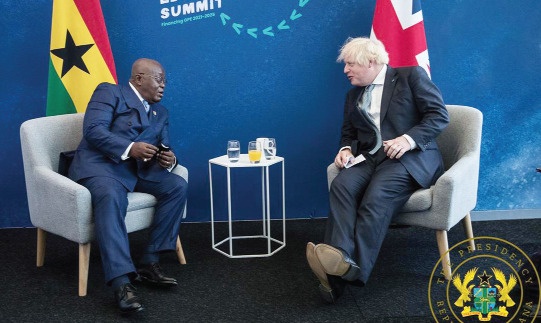Tomorrow, September 1, commences a series of tariff liberalization measures required under the Ghana-UK Interim Trade Partnership Agreement (ITPA).
The Ghana-UK ITPA was ratified by Parliament in May this year after the UK completed processes to exit the European Union (EU). The move provided an opportunity for the two countries to renegotiate new tariff regimes since the UK could no longer use EU trade terms with its partners.
The agreement secures a tariff-free and quota-free access for Ghanaian products to the UK market and preferential tariff reductions for UK exports to the Ghanaian market.
The agreement replaces the interim Ghana-European Union Economic Partnership Agreement which governed trade relations between Ghana and the UK until the Interim Economic Partnership Agreement ceased to apply to the UK on December, 31, 2020 when the latter exited the European Union.
Ghana’s range of exports to the UK include cocoa, cocoa preparations, mineral fluids and oil, fish, fruits whereas the UK exports clothing/textiles, machinery, and mechanical appliances, and chemical products to the Ghanaian market.
Currently, the country is already benefiting from the treaty as vegetable and fruit exporters enjoy duty and quota-free access to the UK market for goods originating from the country.
Technical Advisor in charge of Multilateral, Regional and Bilateral Trade at the Ministry of Trade and Industry, Anthony Nyame-Baafi is resolute that the ITPA is in the country’s interest because without it, about two-thirds of Ghana’s non-traditional exports would have to face higher tariffs with the potential to suffocate the country’s fast-growing non-traditional exports.
Mr. Nyame-Baafi maintained that Ghana will enjoy 100% duty-free quota-free market access to the UK for all imports from Ghana except arms and ammunition. On the other hand, Ghana is obliged to asymmetrically and progressively open 80% of the country’s market to UK goods, taking full account of the differences in levels of development between Ghana and UK.
Ghana will also exempt 20% of sensitive and special imports products from the UK to Ghana.
In view of the nuances associated with the UK’s exit from the European Union, it became imperative for countries like Ghana with long-standing trade relations with the UK, to fashion out a new bilateral agreement so that trade between them would not be disrupted and that resulted in the ITPA.
Even though Ghana may lose some revenue in the tariff liberalization, Nyame-Baafi says the bright side is that the country will enjoy development cooperation and financial support in return from the UK.
Accommodation for health personnel should complement Agenda 111…
While Agenda 111 is a laudable initiative meant to provide adequate health facilities in all districts of the country, the Ghana Registered Nurses and Midwives Association (GRNMA) wants government to go a notch higher and add nurseries and bungalows to the Agenda 111 architectural designs, since their inclusion would be critical to the delivery of quality health care.
President of the Ghana Registered Nurses and Midwives Association (GRNMA), Perpetual Ofori-Ampofo made the passionate appeal through our medium and observed that it is important to have accommodation facilities for health workers.
We believe the appeal is timely since we are just at the beginning of the construction phase of the entire enterprise. Accommodation brings a lot of financial burden on the nurses and the midwives and if they are well accommodated, they will have the peace of mind to work which is crucial to proper healthcare delivery.
The GRNMA President also stated that that a cursory glance at the demography of today’s nurses show that many would need reliable nursery centres in the coming years to take care of their newborns.
“A lot of the nurses are in their youth and are now getting married and giving birth; when there is a baby and the nurse has no relative where he or she has been posted, it causes a lot of frustration, and the person might not work soundly. If there are nursery facilities, the nurse would just have to hand over their child, go to work and after, come to pick their kids”.
Agenda 111 is a good move but when these facilities are added, it will make it even more relevant since the health officials would not have to worry about accommodation problems and concur fully with the position of the GRNMA.
Agenda 111 is potentially the largest healthcare project in West Africa and must be done comprehensively that is why the input of the GRNMA must be incorporated. Consider all the health professionals undergoing training, when they complete and are assigned, they would need adequate accommodation to set their minds at ease.
We are confident that those in charge of the project will see the sound advice offered by the GRNMA










